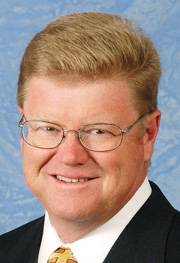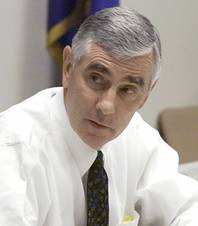Friday, Aug. 26, 2011 | 2 a.m.

Mark Amodei

Todd Russell
Sun archives
- Kate Marshall says review of judge who failed to disclose potential conflict in special election court battle likely (8-12-2010)
- Carson judge’s relationship with Amodei casts cloud over his decision that paved way for Republican to be frontrunner (8-3-2011)
- Judge ridicules secretary of state’s “absurd” decision, claims “irreparable harm” to GOP in special election ruling (5-23-201)
When Todd Russell and Mark Amodei decided to buy a mining claim, it was almost a joke, a novelty, a way to own a piece of Nevada history, perhaps.
The $500 sagebrush-covered plot along the border of Storey and Lyon counties is still inaccessible by road, has little prospect of being developed and hasn’t grown a cent in value since the two men — law partners at the time — bought it from an elderly Carson City man a decade ago. In fact the land is so forgettable the pair have been late on their $17 in annual taxes more often than not.
But the little plot of land is center stage in the special congressional election featuring Amodei as the Republican nominee and Russell as the District Court judge who issued a key procedural decision that vastly improved Amodei’s chances of victory.
Russell failed to disclose his relationship with Amodei or their joint mining claim before issuing his decision rejecting Secretary of State Ross Miller’s open ballot rules this summer. The oversight prompted an outcry from Democrats, who are accusing the pair of trying to hide a conflict of interest.
The incident has also opened a window into the insular political world of Carson City — a town whose mayor is also a high-profile business lobbyist — and its tiny judicial district that routinely decides cases with statewide ramifications, affecting some of Nevada’s most powerful interests.
In his short time on the bench, Russell has decided the special election format, allowed Tea Party candidate for the U.S. Senate Scott Ashjian on the 2010 ballot, issued a landmark decision related to how elected officials are recalled, and has been assigned the case that will decide the boundaries of Nevada’s congressional and legislative districts for the next 10 years.
Russell, who ran unopposed in 2008 and was elected by fewer than 7,000 Carson City residents, also decided the Caesars Entertainment ballot initiative for a special tax to fund a sports arena on the Strip.
(Russell doesn't talk with the press, according to his secretary. He declined to respond to an interview request from the Las Vegas Sun.)
Indeed, Russell and Judge James Wilson Jr., the two judges in Nevada’s 1st Judicial District in Carson City, not only decide much of the state’s election and ballot initiative law, they also are responsible for interpreting and reviewing the state’s tax law, gaming regulations and decisions by the Public Utilities Commission. State law places such cases under the court’s jurisdiction.
“For two judges in a tiny little capital city, that compared to the humongous number of judges in Clark County and the tremendous number of people down there, you have a lot of major decision being made by Russell and Wilson,” said Lorne Malkiewich, director of the Legislative Counsel Bureau in Carson City.
Another lawyer with a statewide practice, who was granted anonymity to speak frankly, put it more succinctly: “There is no question those guys are the most powerful judges in the state.”
There’s also no question that the small-town environment will yield conflicts of interest for those judges.
Russell, directly descended from Carson City’s political lineage, was appointed to the bench by Gov. Kenny Guinn in 2006.
Russell’s father, Charles Russell, served two terms as Nevada governor in the 1950s. Todd Russell spent eight years growing up in the Governor’s Mansion. His children went to high school with Miller in the 1990s, when Miller’s father, Bob Miller, was governor.
Russell practiced law for decades in Carson City with the firm Allison MacKenzie. The firm was founded by one of Nevada’s most prominent senators, Paul Laxalt.
Perhaps ironically, given the political attacks he’s found himself the target of, Russell served as chairman of the Nevada Ethics Commission before he was appointed to the bench. He also served as legal counsel for the Carson City School District.
Russell, a registered Republican, was never outspoken about his personal politics, his former colleagues said.
“He was very cautious about not having his politics bubble up to the surface and being an activist,” said John Griffin, a Reno lawyer who practiced law with Amodei and Russell at Allison MacKenzie.
(In another example of small-town Carson City, Griffin’s father, Michael Griffin, spent 28 years as one of the two judges in the 1st Judicial District. The Griffins and the Russells also lived in the same neighborhood when he was growing up.)
Lawyers speaking both on and off the record spoke highly of Russell as a judge, saying he’s sharp, measured and always eminently prepared for court.
“He’s really a great judge and he was a really good lawyer,” said one lawyer who has practiced in Northern Nevada for more than a decade.
Mike Griffin, who Russell replaced, said, “He’s a very good judge. He’s very well-prepared. He’s very careful. His decisions are pretty well reasoned.”
Mike Griffin acknowledged the 1st Judicial District can be a difficult place to serve as a judge, saying he was no stranger to thorny cases. In one instance he found himself ruling on whether the Nevada Legislature had violated the open meeting law at the same time lawmakers “were deciding our salaries.”
But Griffin said he was scrupulous about keeping politics out of his decisions.
“I just tried to ignore the politics,” he said. “I was always very politically aware, but I knew as soon as I started thinking about politics I was doomed.”
Russell hasn’t been accused by critics of being overtly political in any of his decisions, but some have complained he’s overly sharp-tongued in some of his rulings, particularly those against Miller.
In the special election case, for example, he accused Miller of coming to an “unreasonable and absurd result” in his interpretation of the untested state law governing special congressional elections.
“It wasn’t that we just lost, there would often be a slap in there,” said one lawyer with experience before Russell. “Usually courts are much more formal and reserved.”
Others have also privately questioned his decision to hand the redistricting task to special court masters, rather than send it back to the Legislature to perform its constitutional responsibility of redrawing the congressional and legislative district lines.
His refusal to defer to the executive branch to execute the law as handed down by the Legislature — rejecting Miller’s interpretation in two high-profile cases and taking on redistricting himself — is seen by some as judicial overreach.
“There’s no question there’s a political side of all the cases that come through him and that’s been interesting to him,” said one lawyer. “But that’s partially why he’s in the trouble he’s in now. He comments on the politics of it.”
Russell has positioned himself to be an arbiter in some of the state’s most political cases.
And as one longtime jurist put it: “He’ll learn.”

Join the Discussion:
Check this out for a full explanation of our conversion to the LiveFyre commenting system and instructions on how to sign up for an account.
Full comments policy